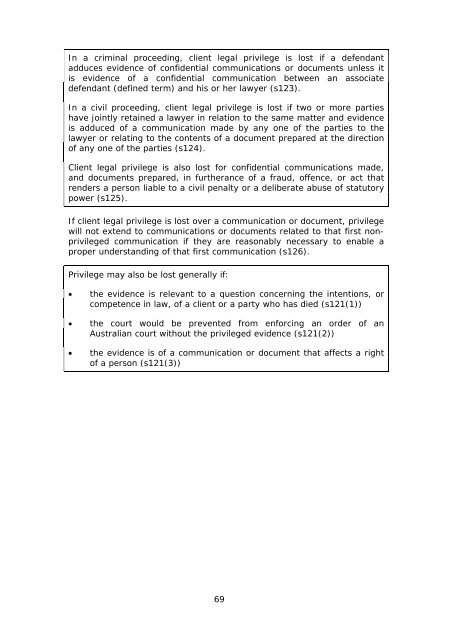Introduction to the UEA - Victorian Law Reform Commission
Introduction to the UEA - Victorian Law Reform Commission
Introduction to the UEA - Victorian Law Reform Commission
Create successful ePaper yourself
Turn your PDF publications into a flip-book with our unique Google optimized e-Paper software.
In a criminal proceeding, client legal privilege is lost if a defendant<br />
adduces evidence of confidential communications or documents unless it<br />
is evidence of a confidential communication between an associate<br />
defendant (defined term) and his or her lawyer (s123).<br />
In a civil proceeding, client legal privilege is lost if two or more parties<br />
have jointly retained a lawyer in relation <strong>to</strong> <strong>the</strong> same matter and evidence<br />
is adduced of a communication made by any one of <strong>the</strong> parties <strong>to</strong> <strong>the</strong><br />
lawyer or relating <strong>to</strong> <strong>the</strong> contents of a document prepared at <strong>the</strong> direction<br />
of any one of <strong>the</strong> parties (s124).<br />
Client legal privilege is also lost for confidential communications made,<br />
and documents prepared, in fur<strong>the</strong>rance of a fraud, offence, or act that<br />
renders a person liable <strong>to</strong> a civil penalty or a deliberate abuse of statu<strong>to</strong>ry<br />
power (s125).<br />
If client legal privilege is lost over a communication or document, privilege<br />
will not extend <strong>to</strong> communications or documents related <strong>to</strong> that first nonprivileged<br />
communication if <strong>the</strong>y are reasonably necessary <strong>to</strong> enable a<br />
proper understanding of that first communication (s126).<br />
Privilege may also be lost generally if:<br />
• <strong>the</strong> evidence is relevant <strong>to</strong> a question concerning <strong>the</strong> intentions, or<br />
competence in law, of a client or a party who has died (s121(1))<br />
• <strong>the</strong> court would be prevented from enforcing an order of an<br />
Australian court without <strong>the</strong> privileged evidence (s121(2))<br />
• <strong>the</strong> evidence is of a communication or document that affects a right<br />
of a person (s121(3))<br />
69

















